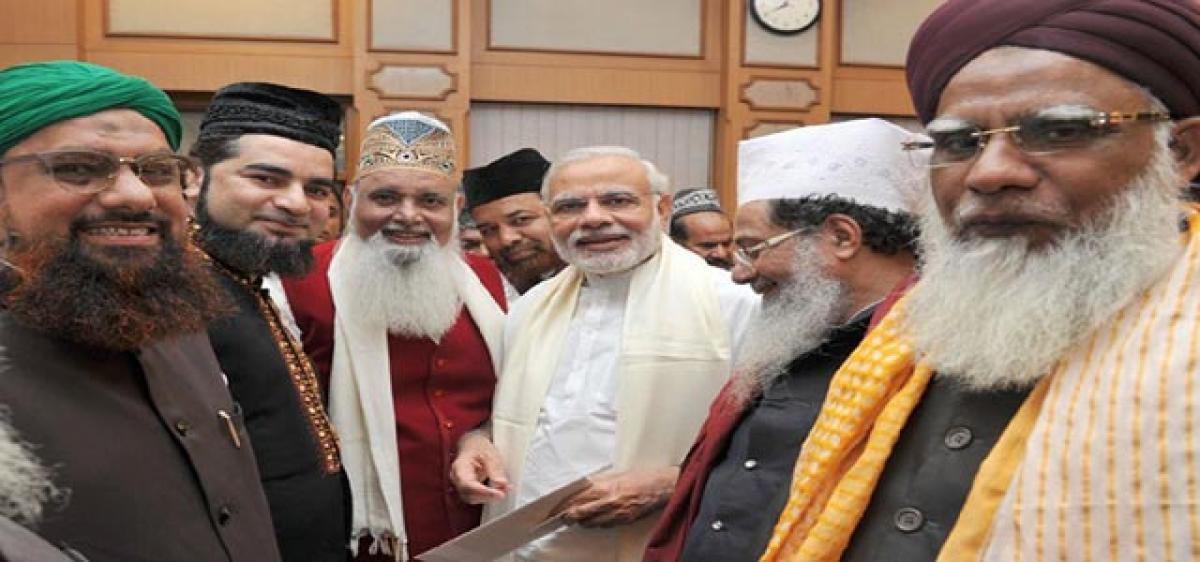Live
- Japan: Citizens protest US military-related sexual violence
- Buy on dips strategy working well in Indian stock market amid sharp rebound
- Sri Lanka concludes sovereign bond restructuring
- Lal Krishna Advani hospitalised at Delhi's Apollo Hospital
- Modi performs puja at Triveni
- Jammu records season’s lowest minimum temperature as Kashmir valley shivers
- Scheme to give Rs 1K to women to be rolled out in 15 days
- Flirty Texts That Turn into Dates
- ‘Asli’ Sonakshi shares a glimpse of herself in ‘golden hour’
- Shraddha Kapoor took ‘thepla’ for her ‘foreign’ trip
Just In

A major reason why the BJP is believed to be finding it difficult to cross the finishing line with ease in the ensuing UP assembly elections is its loss of the Muslim vote since 2014, when it had secured more support from the community than ever before.
A major reason why the BJP is believed to be finding it difficult to cross the finishing line with ease in the ensuing UP assembly elections is its loss of the Muslim vote since 2014, when it had secured more support from the community than ever before.
Winning over the community is essential in a state where the Muslims make up 19.3 per cent of the population. Their vote is now expected to be shared mainly by the Samajwadi Party (SP)-Congress combine and the Bahujan Samaj Party (BSP) with the tilt favouring the former because its chances are perceived to be better.
The BJP will rue this shift of preference because it had the support of a sizable section of the Muslims in the parliamentary polls. According to the Centre for the Study of Developing Societies (CSDS), 10 per cent of the Muslims in Uttar Pradesh voted for the BJP three years ago, evidently because they were impressed by Narendra Modi's pitch for development.
It is also noteworthy that a large number of Yadavs, who form the SP's core base of support, and Jatavs, who constitute the BSP's vote bank, also leaned towards the BJP. It was obviously Modi's promise of "achhey din" (good days) which acted as an incentive.
But the increase in the Muslim preference for the BJP was of greater significance because of the traditionally fraught relations between the minorities and the saffron brotherhood. However, a CSDS researcher noted that the backing of the Muslims for the BJP in 2014 was the highest in the Lok Sabha's electoral history.
Of the 87 parliamentary seats in the country with a high concentration of Muslims, the BJP won 45. These included all but one of the 27 seats in Uttar Pradesh, demonstrating how the members of the community had turned away from their earlier favourites, the SP and the BSP, in favour of the BJP.
It is obvious that if Modi had been able to retain this block of support, his party would have had a fairly easy run in the forthcoming assembly elections. Considering that he still enjoys the faith of large sections of the people, mainly of the middle class, in his promise to accelerate development, there is no reason to doubt that the Muslims, too, would back him now as in 2014.
If they have drifted away, however, the fault lies with the Prime Minister's failure to check the hardliners in the BJP much earlier. He has now succeeded in largely silencing the "ghar wapsi" and "love jehad" brigades, but his action against them has come too late in the day to reassure the Muslims. Had he cracked down on them immediately after his Lok Sabha victory, the BJP might not only have been able to hold on to those Muslims who had reposed their new-found faith in the party but also attracted others from the community.
This accretion would have been possible even if the economy had not taken off with the speed that was earlier expected. But the moment was lost because the Yogi Adityanaths and the Sakshi Maharajs interpreted the BJP's majority in the Lok Sabha as a sign for pushing their Hindu nationalist agenda.
Yet, as a former pracharak (preacher), Modi would have known the central tenets of their anti-minority mindset. If he took his time in acting against them, as he had done in the post-2002 period in Gujarat, the reason perhaps was that he was not sure of how far he could go against the vested communal interests in the party and the parivar at the national level.
But his reluctance to be more proactive in this respect is now proving to be his worst electoral disadvantage. This drawback became clear as early as in 2015 when the BJP was decimated in the Delhi assembly elections although it had won all the seven parliamentary seats in the national capital a year before.
Since then, the BJP has suffered a series of defeats in assembly elections in Bihar, West Bengal, Kerala, Tamil Nadu and Puducherry, putting into shade its excellent showing in virtually all the contests in 2014. This failure on the BJP's part has enabled even the down-and-out Congress to claw its way back into reckoning, which would not have been possible if Modi had been able to retain the momentum of 2014 when he was seen as non-sectarian.
The opportunity which he had, therefore, to mould the BJP in his own forward-looking image has seemingly been lost. However, Uttar Pradesh is his last chance. If a hung assembly shows that the BJP can at least come close to the half-way mark, it will mean that the party can still find its way back if it is prepared to crack down on the saffron hawks.
By Amulya Ganguli

© 2024 Hyderabad Media House Limited/The Hans India. All rights reserved. Powered by hocalwire.com







